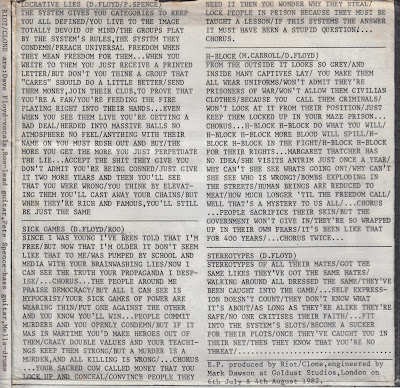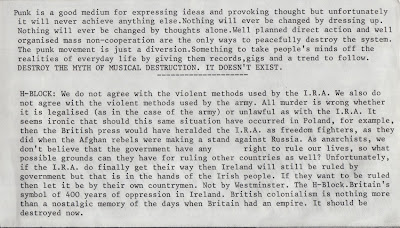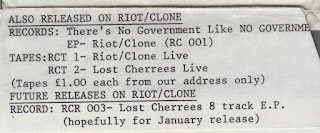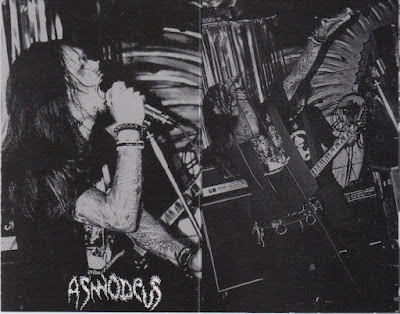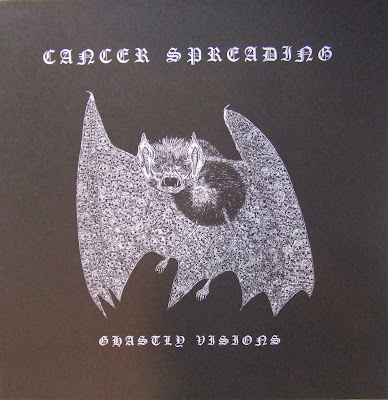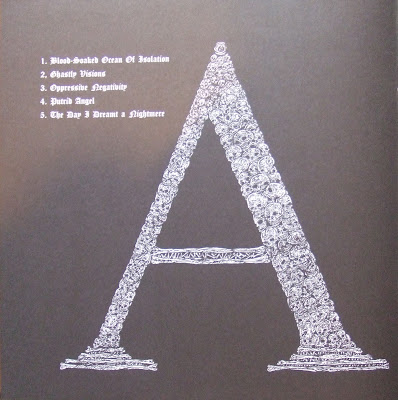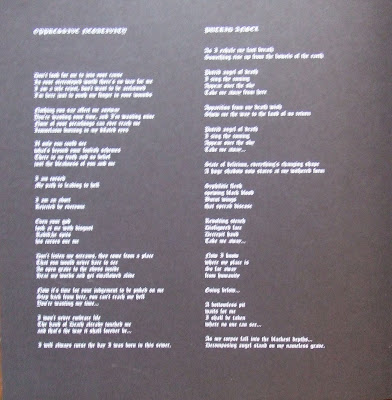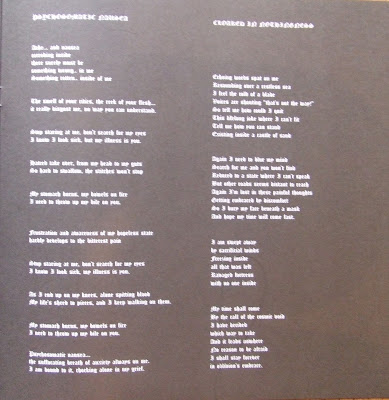I first became aware of Riot/Clone in the very early noughties. For me, it was this exciting time when I was hungrily exploring the anarcho and crusty worlds which seemed to hold so much promise, enticed as I was by their black-and-white universe. I was a young idealist, and although I never was a spotty kid, I certainly had the typical arrogance of my age for I endeavoured to know everything there was to know about the British punk scene and nothing could have stopped me in my self-righteous quest. This thirst for knowledge was the one strict rule I lived by, my holy principle, my one-line Hagakure and if it took dilapidating my meager savings on - retrospectively - average UK punk, bothering old-timers tirelessly about taping me Anthrax and Disrupters songs (two bands I had not listened to but - for some unfathomable reason - I was absolutely certain I would love) until the early morning hours or spending whole afternoons in that one good record store listening to dozens of old 80's records without ever buying any (truth be told, the owner was more than used to this kind of behaviours and did not really care), then so be it. I used to make long lists of bands I had to hear and would progressively cross their names whenever I eventually did. And I still do actually.
But back to Riot/Clone. One of my best mates was just back from London where he had bought randomly a few records from a local distro. He rang me up and asked me if I was up for listening to these novelties with him. Two hours later, I was at his place and we were looking at a mysterious pile of vinyls that just demanded to be played. One of them was Bare faced hypocrisy sells records, that anti-Chumbawamba Ep that was released on Ruptured Ambitions in 1998. Neither of us had really heard Chumba then. What we did know however was that the band had "sold out" terribly and that they had penned the anthem of the French world cup a few years before. I owned the video game so I was well aware of the fact. Despite our relative ignorance of the different issues that surrounded Chumba and completely unaware of the legacy of this formidable band, we completely agreed with the feelings behind the Ep that my friend must have bought originally because it had The Bus Station Loonies on it and he was crazy for them as he had seen them live during his stay in London. I noticed that it also included an Oi Polloi song (which was synonymous with sound politics) and had one band whose name I had written down on one of my lists: Riot/Clone with the song "Chumbawanka". I can still distinctly remember how awed I was upon first hearing that song. The music was alright, good even, energetic punk-rock, but what completely floored me was how angry the vocals sounded. The singer sounded SO pissed. I thought that he must have been mate with Chumbawamba and that the treason felt like a stab in the back to him, something like this. With hindsight, I now realize that it was the commodification of the anarchopunk politics and the resigned acceptance implied in Chumba's selling-out that angered R/C so much. The whole rock'n'roll swindle from one of our own basically. Of course, I have become a massive Chumba fan with the years but I can still remember the thrill of excitement that produced Dave Floyd's vocals when I first heard "Chumbawanka". And to this day, whenever I play it (I eventually bought the Ep), I still sing along to the chorus with an invisible microphone in my bedroom, though I have now learnt to draw the curtains before doing so. Just irresistible.
Throughout the years, I haven't been the only one to be impressed with Dave's vocal work. I do not remember when or where I first read it (possibly in a zine or on an old message board), but none other than Quorthon (of Bathory) was influenced by R/C (here is the proof). Funnily enough, he thought of the band as "oi/punk" probably because of the song "Bottled oi" that was on the first R/C Ep There's no government like NO government which he owned (but apparently did not read the lyrics to, or could it be that the term used in Sweden to classify second-wave UK punk-rock was "oi/punk"? Both I would assume.). I have always thought of early Bathory as being primarily influenced by GBH (The Exploited and Disorder are also on Quorthon's list, but surprisingly not Discharge if you need to know) but I can understand how the first R/C Ep helped shape the early Bathory sound. It is a primitive, straight-forward, dynamic Ep with simple but catchy punk-rock songs and really upfront vocals with the highly recognizable - and accented - voice of Dave making it impossible to mistake for any other punk bands. Somewhere between an angry snarl and a snotty sneer, it sounds viscerally angry and threatening but also slightly somber and woeful, demented even, as if he were directly talking to you about what pisses him off, how pissed off he is, how angry he is to be that pissed off and how depressing it is to be that angry all the time. It makes sense that Quorthon loved it.
Destroy the myth of musical destruction was R/C's second record, released in late 1982 on their own label. The band took (and still does) the DIY ethos inherent in anarchopunk very seriously and, not unlike Six Minute War (with whom they actually also shared similarities in terms of sound), they released their first three Ep's (as well as Lost Cherrees' No fighting No war No trouble No more) on their own Riot/Clone Records. This late '82 offering is my favourite one from the band's 80's catalogue. The production is still very much on the raw side of punk-rock but more polished than on its predecessor and the playing as well as the songwriting are also more focused. It contains two mid-paced anthems that would easily get any self-respecting punk's foot tapping and two fast UK82 punk numbers that would have the very same punk reach for a cold can of cider. The dark-toned "Lucrative lies" reminds me of early Rubella Ballet while "H-block" - possibly the Ep's strongest number - has a delightful The-Epileptics-meets-Six-Minute-War-in-South-London's-Crass-cache vibe. As mentioned, "Sick games" and "Stereotypes" are faster and hard-hitting, a bit like a bland of early Conflict, Subhumans and Disorder. I particularly enjoy how the guitar work corresponds to the different humours present on the record. It thrashes when it must and then switches to moody when required. The bass lines do the job perfectly, they are not particularly articulate but then, and to borrow a phrase from Ian Glasper when he described R/C's sound, the strong point of the band was to write "simple-yet-memorable tunes". And isn't that the key to write a good punk-rock song?
The running topic of Destroy the myth of musical destruction is... punk. Or rather how punk grew to corrupt its own ideals by creating its own rock stars, rigid dress codes and silly attitudes. The short text provided in the foldout is interesting. It argues that punk-rock, just like any youth cult before it, failed by replicating the same systemic mistakes, by reducing its essence to just music and fashion. It does not state that punk is completely useless but that it appears to be a pointless diversion for wannabe revolutionaries: "Punk is a good medium for expressing ideas and provoking thought but unfortunately it will never achieve anything else. Nothing will ever be changed by dressing up. (...) The punk movement is just a diversion. Something to take people's mind off the realities of everyday life by giving them records, gigs and a trend to follow." Harsh but nevertheless true I suppose. Two songs from the Ep deal with this topic, "Lucrative lies" is about the money-grabbing self-appointed leaders of the first wave of punk-rock and "Stereotypes" tackle the social conformity to the system's expectations and although it is not openly directed at the punk scene, the fact that the whole Ep revolves around the issue of punk's relevance indicates that it is not far-fetched to read it as a comment on punk stereotypicality. "Sick games" is a more classic song about power games and social conditioning with top-notch lines such as "If this system's the answer, it must have been a stupid question", while "H-block" is about IRA prisoners who went on hunger strikes during Thatcher's rule. The band thought wise (and it was) to explain the song's polemical motive a bit more and point out that it is about the British government's hypocrisy toward its political prisoners and the story of colonialism in Ireland. Definitely a smart band.
Following this Ep, R/C released the Blood on your hands? Ep about animal rights in 1984. They reformed in the 90's, stronger and angrier than ever and recorded the massive 1995 double Lp Still no government like NO government (which contained re-recordings of all R/C's early sings), then the To find a little bluebird Lp in 1997, a cracking album with a horrible cover, Do you want fries with that? in 1997 and Success in 2007, which, despite a song about the Chelsea FC (about the gentrification of football really), was actually a solid effort. And R/C are back since you can expect a new Ep very soon. And the best thing is that, after all those years, Dave still sounds as pissed off as he did in 1982, 1995 or 2007. Only now I know it is not all Chumbawamba's fault.
Fun facts about this record. "Dave Floyd is god" has been etched on the A side, while B has "She's got it well suss'd cos all we want is peace". I am not sure what it is supposed to mean (a go at Thatcher? Dave Floyd being a descendent of Jesus Christ? Drunken private jokes?) but there you go.


